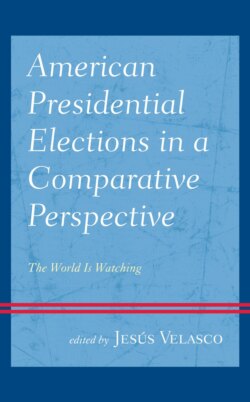Читать книгу American Presidential Elections in a Comparative Perspective - Группа авторов - Страница 23
На сайте Литреса книга снята с продажи.
AMERICA’S ELECTION: WHY DOES CHINA CARE?
ОглавлениеThere are compelling reasons China should be highly concerned about the US presidential elections, considering the enormous stakes that China has in its dealings with the United States as well as China’s hope of maintaining a stable and cooperative bilateral relationship. To state the obvious, the economic interdependence between China and the United States, the world’s two biggest economies, has grown to the extent that neither side could take strong actions against the other without seriously undermining its own interests. The extent of this economic interdependence has been attested to by the strong warnings about and opposition to the prospect of a China-US trade war under the incoming Trump administration by pundits from both countries.5 While bilateral trade and investment still serve as the key foundation of China-US cooperation, the relationship has become increasingly grounded in new areas that include global governance and closer general collaboration between the two nations. As China’s economic importance and global influence continue to grow, the future of international peace and development will largely depend on how well China and the United States can manage their differences and avoid conflicts while pursuing and expanding their shared interests.
Despite its rising economic, political, and military power, China is constantly reminded of both the benefits and constraints of living in a world order invented and dominated by a nation whose values and ideologies are opposed to its own. Given the United States’ superpower status, the Chinese government deeply appreciates the strategic significance of maintaining a stable and positive relationship with the United States for the sake of its own domestic peace and development.6 Because US presidential elections and the ensuing transfer of power inevitably give rise to changes—large and small—in the United States’ policy toward China, China is naturally sensitive to the dynamics of the electoral process as well as the election outcome.7
From the Chinese perspective, however, the 2016 presidential election was drastically different from past US elections in at least two respects. First, the timing of the election was unique, both in terms of America’s domestic politics and China-US relations. The 2016 presidential election took place against the backdrop of what Francis Fukuyama has famously termed the “American political decay,” a notion that since its introduction has become popular among China’s experts on the United States.8 According to one Chinese expert, the election reflected the accumulation and explosion of long-term, multiple sources of the American people’s anger and frustration over polarized politics, unresponsive government, a weak economy and a weakened middle class, rising tension over social and racial divisions, and a perception of the United States’ failing global leadership.9 For another scholar, the election posed unprecedented challenges to the three core components—political, ethno-racial, and global—of American identity.10 In this sense, the 2016 election was unique in that it had provided the Chinese a rare chance to “evaluate the US system of democracy when watching its general election.”11 What is more, the perceptions of the Chinese about this particular election, and by extension America’s political system, will have far-reaching implications for China’s own democratic process.
Whether it spells disaster for American democracy or marks its renewal, the 2016 election merits special attention from China because it also happens to be held at a critical juncture in the Chinese-US relationship. With China’s rapid rise in national power and global influence, recent developments in the relationship seem to suggest that China and the United States might already be caught up in the so-called Thucydides Trap, as rising tensions over regional issues are driving the two countries toward a collision.12 Meanwhile, the United States is becoming increasingly wary of China’s growing assertiveness, and has begun to reassess its engagement strategy with China. Some believe that the current debate in the United States will likely produce significant US policy changes toward China.13 While election years in the US are known to be a source of instability for China-US relations—issues related to China are frequently convenient targets for presidential candidates—this year’s election and the new administration it produces will most assuredly add unusual uncertainty to an already strained relationship.
In addition to the timing, many pundits and most ordinary Chinese were drawn to the election because of this year’s unconventional candidates and their never-ending scandals. For those Chinese who are already exposed to the fictional dark side of American politics through watching the House of Cards, the drama and ugliness prevalent in the 2016 election were more intriguing, stirring, and even horrifying than fiction.14 Because of either schadenfreude or a form of pseudo participation, the Chinese seemed to derive more excitement and entertainment out of the election the uglier it became. For example, when Trump and Clinton were at each other’s throats on the debate stage, the Chinese public was glued to the debates, sharing memes and funny videos of the candidates on social media.15 In other words, the main attraction for a considerable number of Chinese this year comes from the negativity and ugliness of American politics as exposed through the electoral process.
At this point, there is no doubt China is a most important stakeholder in the 2016 US presidential election, and its elites and citizens alike have reason to be unusually attentive to the election. Now that the question of why has been settled, the next question is how did the Chinese perceive the election, that is, how did they view the major candidates as well as the main issues that relate to China?
